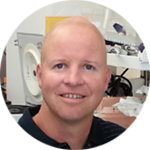Investigators: Ali Ozes PhD, Fran Sverdrup PhD
Category: Research - Translational
Facioscapulohumeral dystrophy (FSHD) is a progressive disease commonly associated with loss of muscle in the face, scapula and humerus. FSHD affects 500,000 people worldwide and is incurable. Sadly, additional symptoms have also been associated with progressive disease that include vision changes, loss of hearing and abnormal heart rhythms.
Expression of Double Homeobox 4 (DUX4) protein in FSHD patients causes muscle cells to die overtime. Studies in human cells and in mice show that blocking DUX4 can stop further muscle death and could be a way to treat FSHD. However, there are currently no known drugs that bind and inhibit DUX4 directly.
At Altay, we developed an approach that can find drugs that block the activity of DNA binding proteins like DUX4. With the funding support provided by Friends of FSH Research, the goals of our first project were to use our platform to identify new druggable sites within DUX4 and discover drugs that bind and inhibit DUX4 activity.
We have now completed the screen using our platform and successfully identified a novel DUX4 inhibitor, DX5. Next, we designed 21 analogs of DX5 that validated critical DUX4 interacting sites. Significantly, we have developed 4 additional analogs of DX5 with enhanced DUX4 inhibition. Importantly, DX5001 was found to be 20-30 times more effective than DX5 (40nM DUX4 inhibition). Our preliminary studies show that DX5 and its analogs are 1) non-toxic, 2) inhibit DUX4 activity, 3) Reduce DUX4 target genes, and 4) rescue DUX4 dependent cell death.
We are grateful that Friends of FSH Research connected us to Dr. Fran Sverdrup who has agreed to support us on our second project. The goals of our second grant are to develop our DUX4 inhibitors and demonstrate that they inhibit DUX4 in muscle cells and in mice without inhibiting normal muscle function. The successful completion of this project would move us one step closer in developing a clinic ready drug to treat FSHD.
Related Material
See Altay Therapeutics - Science 101 video on technology overview.







Connect with us on social media